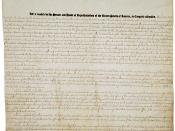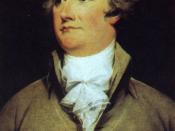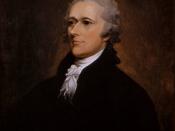DBQ: Growth of Political Parties In current times, the American political system is most commonly associated with the ongoing conflicts between political parties. The two major parties that strive for control of the American vote are the Democrats and the Republicans. However, when our government was formed, the political parties were quite different. At first, politicians tried to stay away from political parties, but by creating a democratic government, a political party system could not be avoided. The two recognized parties were the Democratic-Republicans, led by Thomas Jefferson, and the Federalists, led by Alexander Hamilton.
Political parties separated the country. Washington had tried to prevent them from rising up, but due to extreme differences in views, his attempt was futile. Hamilton's strong central government idea contrasted with Jefferson's strong state side government. Sides were taken, and differences were debated. Without a compromise, each party would continue to try and impose their beliefs on the American people.
The Democratic-Republicans appealed more to the common man, whereas the Federalists favored wealthy aristocrats. Financially, the Federalists were much more powerful than the Democratic-Republicans. The wealthy merchants were voted into office originally because of their social and economic status. Prior to Jefferson's administration, many politicians were not publicly known like today. This led to Washington and Adam's government being controlled by the Federalists. Jefferson would win the people and presidency. Jefferson and his supporters would control the government, ensuring that America would remain a democracy.
Alexander Hamilton was Washington's Secretary of Treasury. Over the course of Washington's presidency, Hamilton proposed and passed some federalist bills. These bills led to a public distrust of the Federalist Party. Therefore causing a large portion of the country to side with the Democratic-Republicans. Hamilton's party feared the Democratic-Republicans, saying ""æ. the views of these gentlemen [Democratic-Republicans] are "æ...


